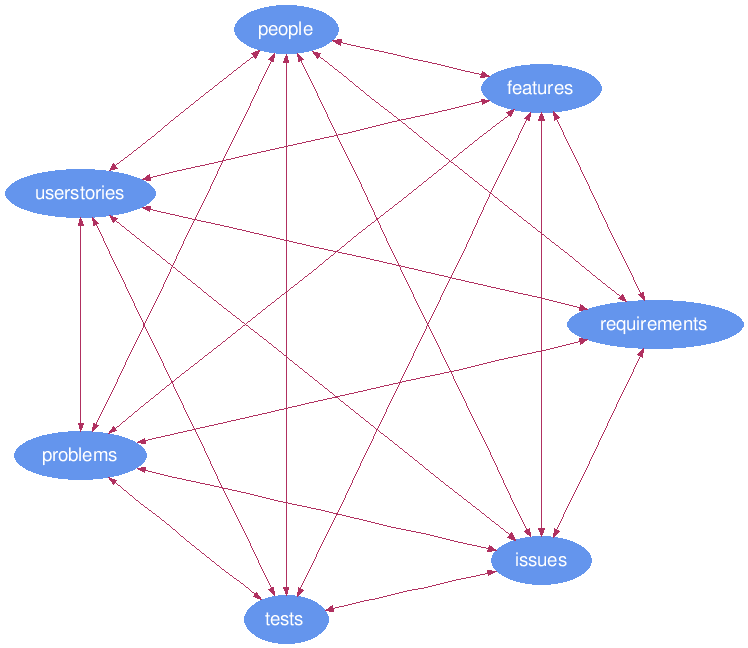- 1. WHY
- 2. SO, WHAT IS THIS ?!
- 3. DEMO
- 4. DOCUMENTATION
- 5. AUTOMATED DEPLOYMENT LOCALLY AND ON AWS IN 35 MINUTES
- 6. ACKNOWLEDGEMENTS
- 7. LICENSE
Why ?! Yet !! Another App ?! ... ¿¿¿¿¿¿¿¿¿¿¿¿¿¿¿¿¿¿¿¿¿¿ !!!
Software development is prohibitively expensive. In fact any endeavour with team of people aiming towards common goal in any field is expensive, even solely based on persons' time spent.
If you want to concentrate to your project, but have a fast, efficient and simple to use tool to manage your projects, you must read further ...
Still here ?! Let's move on !
A generic and simplistic db centric content management system, build on postgres CRUDs ( s stands for search ) and hierarchical nested data-sets MULTIPLE databases from the same web application.An included example application is the "qto application", which is used to manage multiple projects' issues, including itself ;o). The full and extensive https://qto.fi/qto/view/features_doc contains all the features and functionalities of THIS released version.
Figure: 1
the 7 main entities of the qto app

Manage your projects with scale and to the finest granularity of your choice.
Your organisation:
- needs to setup quickly teams and projects for tracking issues, tasks, problems, documentation
- has full trust to the persons per teams for all (except users related data) add, update, delete operations
- might have the need to save technical documentation in versioned md format
- might have the need to constantly update comparably small ( less than 10k rows) (hierarchy) tables
- needs to keep track vertically of documentation and generate pdf, docx and md files out of it
With qto you will gain the following capabilities:
- instance deployment to bare metal/vm install, which should take no more than 40min
- provide db based authentication and restricted access to the app via http(s)
- provide access to the non-technical person via http and/or https for CRUD operations
- quickly define LOTS of tables DDL by using the existing examples and just changing the columns
- search the data from the db via the global search feature
- load initial data via xls ( less than 10k rows per sheet should be ok )
- provide them with initial links to grasp the "semi-sql" syntax
- create and update multiple hierarchical documents via the view doc interface
- load hierarchical docs via xls, export them to md format ( programatically ) or pdf
- lots of automated sysadmin capabilities ( check the docs in the doc/md dir )
You can check the following https://qto.fi/qto/view/enduser_guide_doc of the web app, additionally every doc bellow has it's "it-doc" link aka the "native" qto document format … Use the "[email protected]" and "secret" credentials to login ( simple click of the login button would do it as well ;o) OR even better try to login with your own e-mail and request access from the admin e-mail displayed to the error msg ... Still here ?! Interested to get your own instance up-and-running in the cloud exposed to the Internet ?! Follow simply the instructions in the next section.
Qto IS about documentation , which are aimed to be as up-to-date to the current release version as possible. Thus you get the following documentation set:
- readme_doc-0 - the initial landing readme doc for the project
- userstories_doc-0 - the collection of user-stories used to describe "what is desired"
- requirements_doc-0 - the structured collection of the requirements
- system_guide_doc-0 - architecture and System description
- devops_guide_doc-0 - a guide for the developers and devops operators
- installations_doc-0 - a guide for installation of the application
- enduser_guide_doc-0 - the guide for the usage of the UI ( mainly ) for the end-users
- concepts_doc-0 - the concepts doc Check the doc/md or doc/pdf directories where the generated from the db documents residue in md or pdf format.
The installation guide https://github.com/YordanGeorgiev/qto/blob/master/doc/md/installations_doc.md contains the instructions on how-to deploy both a local instance AND and an aws instance exposed to the Internet in 35 minutes for instance from scratch on top of the Amazon latest ubuntu 18.04 ami, so that you can have 100% control on your binary configuration on your infrastructure.
This project would NOT have been possible without the work of the people working on the following frameworks/languages/OS communities listed in no particular order.
- Perl
- Mojolicious
- GNU Linux
- Vue
- FreeBSD
Deep gratitudes and thanks to all those people ! This application aims to contain the best practices of our former colleagues and collaborators and fellow travellers in life, which also deserve huge thanks for their support and contributions!!! We tend to incorporate and re-use a lot of code snippets from the Stackoverflow and Codepen sites, should you consider that you were the author of those code snippets and you deserve mentioning of the source please let us know ...
All the trademarks mentioned in the documentation and in the source code belong to their owners. This application uses the Perl Artistic license, check the license.txt file or the following link : https://dev.perl.org/licenses/artistic.html
Should any trademark attribution be missing, mistaken or erroneous, please contact us as soon as possible for rectification.
Usual commercial products licensing conditions usually end-up here, you will get the regular "we do not take responsibility if you mess your data / infrastructure with our code" clause ... - qto is designed from the ground-up differently - read features_doc-191215115117